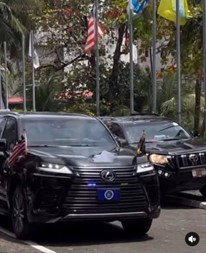The Liberian government’s procurement of opulent, bulletproof vehicles for President Joseph Boakai has sparked a wave of public criticism, particularly given the country’s ongoing economic struggles. This controversy centers around two 2025 Lexus LX 700HR Super Ultra Luxury SUVs, each estimated to cost approximately US$115,000, with an additional US$1.2 million spent on bulletproofing modifications. The vehicles, which debuted as part of the President’s official motorcade at a Central Bank event, have drawn sharp rebuke from citizens who view such extravagant spending as incongruous with the nation’s economic realities and the President’s own past pronouncements on fiscal prudence. The public outcry underscores the delicate balance between ensuring presidential security and maintaining public trust in a nation grappling with poverty and unemployment.
President Boakai’s previous commitment to a modest lifestyle, exemplified by his statement about riding a wheelbarrow to the Executive Mansion, stands in stark contrast to the image projected by these high-end vehicles. This perceived hypocrisy has intensified public anger, with many Liberians feeling betrayed by a leader who seemingly abandoned his earlier pledges of austerity. The purchase also highlights the stark disparity between the government’s spending priorities and the daily struggles faced by ordinary citizens, further fueling the resentment and distrust towards the administration. The controversy underscores the challenges faced by developing nations, where balancing security needs with economic constraints often becomes a point of public contention.
The government’s defense, spearheaded by the Executive Protection Service (EPS), asserts that the vehicles are essential replacements for older models used by the previous administration. EPS Director Sam Gaye has stated unequivocally that they are “unapologetic” about the purchase, emphasizing the necessity of providing adequate security for the president and future leaders. This justification, however, has failed to placate the public, who view the expenditure as excessive and insensitive, particularly given the nation’s pressing economic needs. The disconnect between the government’s explanation and the public’s perception highlights a growing chasm of trust, further exacerbated by the perceived disconnect between the ruling elite and the struggles of the populace.
Activist Martin K. N. Kollie has vehemently condemned the purchase as a “display of ultra-opulence,” drawing a sharp contrast between the luxury enjoyed by the president and the pervasive poverty experienced by many Liberians. He has also raised concerns about a previous expenditure of US$1.1 million in 2024 for vehicles for President Boakai and Vice President Koung, vowing to utilize the Freedom of Information Law to investigate the full extent of these expenditures. Kollie’s outspoken criticism reflects the broader public sentiment, amplifying the demands for transparency and accountability in government spending. His actions also highlight the role of civil society in holding those in power accountable, especially in the face of perceived excesses.
The controversy surrounding the presidential vehicles symbolizes a larger issue of public trust and government accountability in Liberia. President Boakai now faces the challenge of bridging the widening gap between his administration and the citizenry. His ability to navigate this crisis will be a crucial test of his leadership, demonstrating whether he can reconcile the need for presidential security with the demands for fiscal responsibility and responsiveness to the needs of the people. The incident also underscores the importance of open communication and transparency in government operations, particularly in contexts of economic hardship.
The unfolding situation in Liberia serves as a cautionary tale for governments worldwide, highlighting the importance of aligning spending priorities with public needs and expectations. In an era of increasing scrutiny and social media amplification, even seemingly routine expenditures can quickly escalate into major controversies, especially when they are perceived as contradicting stated values or neglecting the well-being of the population. The Liberian government’s response to this crisis will be closely watched, as it could set a precedent for how future administrations handle similar situations. The outcome will likely have a lasting impact on public perception and the relationship between the government and its citizens.














